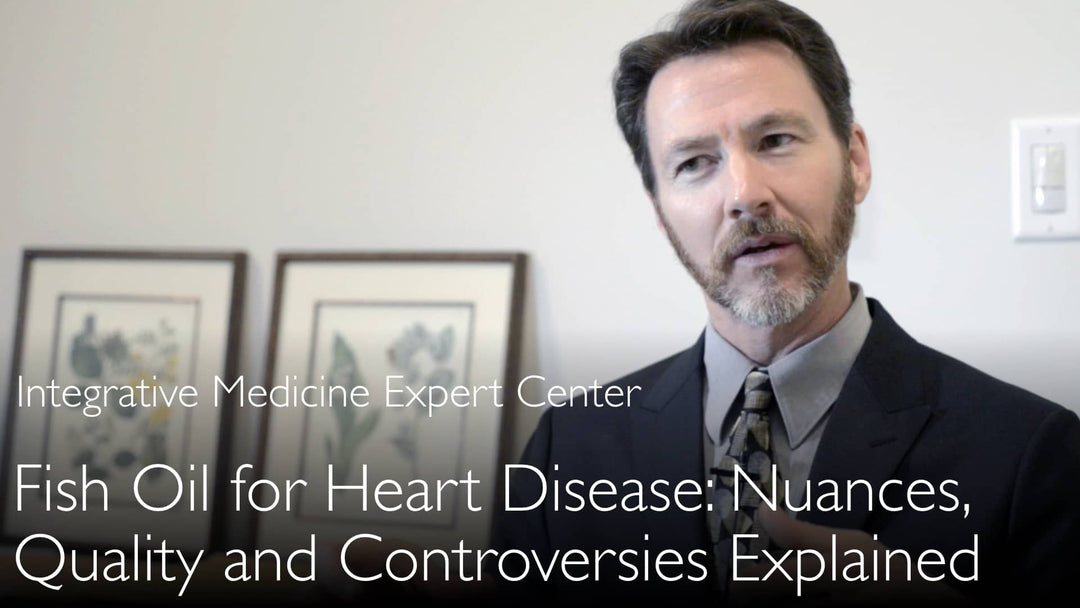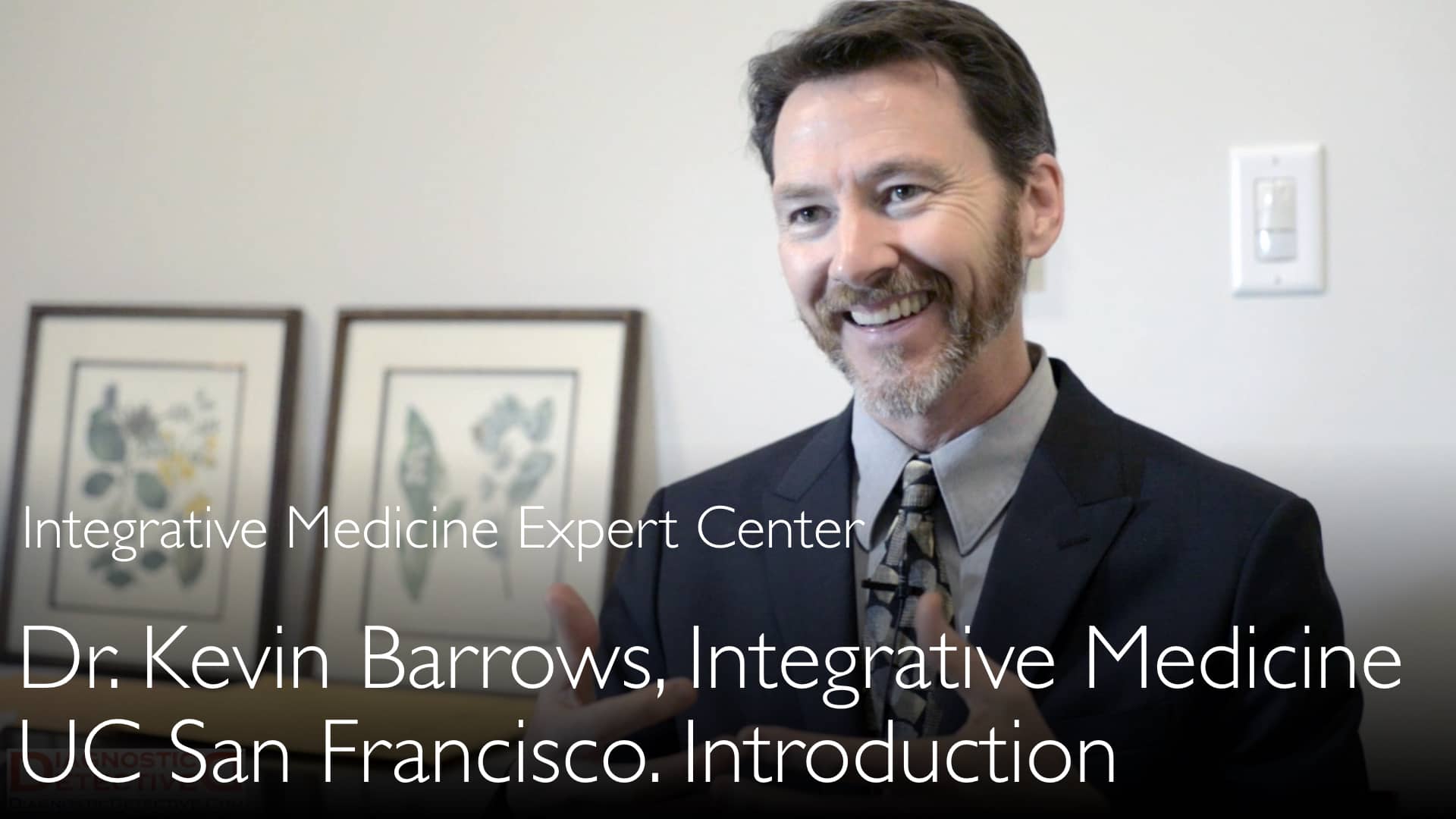Dr. Kevin Barrows, en ledande expert inom integrativ medicin, belyser fiskoljans roll i behandling och förebyggande av kranskärlssjukdom. Fiskolja, som är rik på omega-3-fettsyror, är känd för att sänka triglycerider och förbättra kolesterolprofilen, vilket kan minska risken för hjärtsjukdom. Dr. Barrows redogör för fiskoljans fördelar och säkerhet, samt dess användning inom sekundärprevention av hjärtinfarkt i kombination med standardläkemedel som acetylsalicylsyra och statiner. Han diskuterar också fiskoljans inverkan på lipidpartiklar och dess bredare kardiovaskulära fördelar, och understryker vikten av fortsatt forskning för att fullt ut kartlägga dess effekter.
Fiskoljans roll i förebyggande och behandling av kranskärlssjukdom
Hoppa till avsnitt
- Fiskolja och kolesterolsänkning
- Sekundärprevention av hjärtsjukdom med fiskolja
- Säkerhet vid användning av fiskolja vid hjärtsjukdom
- Kliniska studier om fiskolja och hjärthälsa
- Fiskoljans inverkan på LDL-partiklar
- Fullständig transkription
Fiskolja och kolesterolsänkning
Dr. Kevin Barrows, MD, betonar att fiskolja effektivt sänker triglycerider, en typ av blodfett som är avgörande för hjärtats hälsa. Omega-3-fettsyror i fiskolja förbättrar lipiden och kan jämföras med läkemedel vid behandling av hypertriglyceridemi. Detta naturliga tillvägagångssätt kan vara ett värdefullt komplement till traditionella kolesterolsänkande strategier.
Sekundärprevention av hjärtsjukdom med fiskolja
Dr. Kevin Barrows, MD, diskuterar fiskoljans potential inom sekundärprevention av kranskärlssjukdom, särskilt efter en hjärtinfarkt. Även om läkemedel som acetylsalicylsyra, statiner och betablockerare är standardbehandling, har fiskolja visat sig minska dödlighet och risken för plötslig hjärtdöd. Ytterligare fördelar vid kombination med dessa läkemedel är dock fortfarande under utredning.
Säkerhet vid användning av fiskolja vid hjärtsjukdom
Enligt Dr. Kevin Barrows, MD, är fiskolja generellt säker med minimala biverkningar, vilket gör den till ett föredraget alternativ för patienter med hjärtsjukdom. Även om pågående forskning behövs för att bekräfta dess säkerhet, stöder den låga risken för biverkningar dess användning inom integrerad medicin för hjärtats hälsa.
Kliniska studier om fiskolja och hjärthälsa
Dr. Anton Titov, MD, refererar till en finsk klinisk studie som visade fördelar med ökad fiskkonsumtion på kolesterolsammansättningen. Studien påvisade subtila förbättringar i lipidfraktioner utöver standardlaboratoriemätningar, vilket tyder på bredare kardiovaskulära fördelar av fiskolja och fiskrik kost.
Fiskoljans inverkan på LDL-partiklar
Dr. Kevin Barrows, MD, förklarar att fiskolja kan ändra sammansättningen av LDL-partiklar (low-density lipoprotein), vilket gör dem större och mer flytkraftiga. Större LDL-partiklar bidrar i mindre utsträckning till ateroskleros jämfört med mindre, tätare partiklar. Denna nyanserade effekt understryker vikten av att förstå fiskoljans roll i kardiovaskulär hälsa.
Fullständig transkription
Dr. Anton Titov, MD: Hur används fiskolja för behandling av kranskärlssjukdom? Hur sänker fiskolja kolesterol? Hur kan den förhindra en andra hjärtinfarkt genom integrerad medicinsk behandling? Vilken roll spelar fiskolja i sekundärprevention av hjärtsjukdom? Hur säker är fiskolja vid kranskärlssjukdom? Hur förändrar omega-3-fettsyror lipiden? Hur förbättrar fiskolja kolesterolprofilen? Finns det problem med att använda fiskolja för att förebygga hjärtsjukdom? Hur hjälper fiskolja till att sänka höga triglycerider?
Dr. Kevin Barrows, MD: Ja, det är helt klart att fiskolja sänker triglycerider. Forskningen visar starkt att fiskolja kan behandla hypertriglyceridemi. Fiskolja är lika effektiv som läkemedel för att sänka triglycerider. Det finns till och med en FDA-godkänd version av fiskolja för behandling av hypertriglyceridemi. Det är mer omtvistat om fiskolja kan användas i sekundärprevention av kranskärlssjukdom.
Idag har vi goda läkemedel för sekundärprevention av hjärtsjukdom. Sekundärprevention innebär att förhindra en andra hjärtinfarkt efter att den första redan har inträffat. Vi har acetylsalicylsyra, statiner, ACE-hämmare och betablockerare. Dessa effektiva läkemedel har blivit standardvård för att förhindra ytterligare hjärtinfarkter. Men innan dessa läkemedel blev vanliga, visade fiskolja tydliga fördelar med minskad dödlighet efter hjärtinfarkt. Fiskolja minskar risken för plötslig hjärtdöd och hjärtinfarkt.
Idag används alla dessa kraftfulla läkemedel – acetylsalicylsyra, betablockerare, ACE-hämmare och statiner – hos många patienter för att förhindra nya hjärtinfarkter. Har fiskolja ytterligare fördelar för patienter som redan tar dessa läkemedel? Den frågan är fortfarande obesvarad. Den goda nyheten är att fiskolja nästan saknar biverkningar. Vi måste fortsätta studera fiskolja för att säkerställa att det inte finns några negativa effekter. Men vi använder fiskolja fritt hos patienter med hjärtsjukdom.
Ibland är ett läkemedel mycket toxiskt eller riskabelt. Då behövs starka bevis innan man ger det till en patient. Man måste vara säker på att fördelarna överväger riskerna. Vi skulle gärna se ofelbara säkerhetsbevis för alla naturläkemedel. Men när ett läkemedel är mycket säkert, finns det ofta ingen anledning att tveka att använda det. Många naturläkemedel, som fiskolja, medför sällan skador.
Dr. Anton Titov, MD: Det finns en klinisk studie från Finland som undersökte fördelarna med att lägga till mer fisk, särskilt vit fisk, i den vanliga kosten. Den extra mängd fisk som patienterna åt var inte stor. Ändå visade studien att patienter som åt mer fisk fick gynnsamma effekter på sin kolesterolsammansättning. Viktigt att notera är att fördelarna inte primärt låg i nivåerna av totalkolesterol, LDL eller HDL – de fraktioner som vanligtvis mäts i laboratoriet.
Fördelarna med att äta mer fisk var mer subtila och sträckte sig bortom standardlipidfraktioner. Hälsofördelar sågs i de relativa förhållandena mellan kolesterol- och lipidfraktioner, som endast kunde mätas med avancerade forskningsmetoder. Det finns flera klasser av lipidpartiklar i kroppen, och kolesterolmetabolismen är mycket komplex. Denna studie talar därför för fördelarna med att använda mer fisk och fiskolja för att förebygga hjärtsjukdom.
Dr. Kevin Barrows, MD: Jag håller med. Det är en av mekanismerna bakom fiskoljans positiva effekter på det kardiovaskulära systemet. Fiskolja ändrar sammansättningen av LDL. Ibland stiger LDL-nivåerna något när man tar fiskolja, eftersom det är ett fett. Men om man analyserar LDL-partiklarna närmare, ser man att deras karaktär förändras – de blir större och mer flytkraftiga. Vi vet att större LDL-partiklar är mindre åderförkalkningsframkallande än små, täta partiklar.
Dr. Anton Titov, MD: Så detaljerna spelar roll.
Dr. Kevin Barrows, MD: Exakt! Fiskolja vid kranskärlssjukdom och högt kolesterol. Vilka är nyanserna i användningen av fiskolja vid sekundärprevention av hjärtsjukdom?





